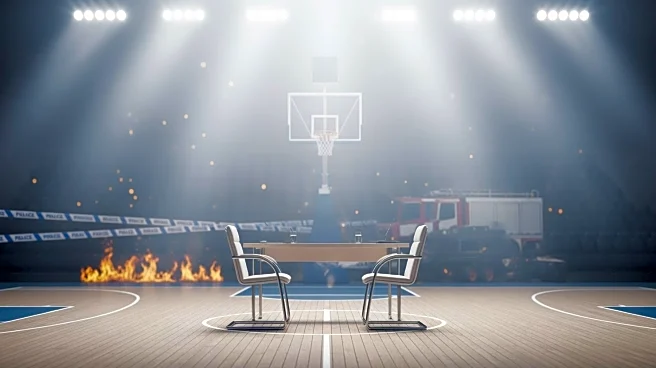What's Happening?
The Women's National Basketball Association (WNBA) is currently engaged in critical negotiations for a new collective bargaining agreement (CBA) as the current one is set to expire on October 31. The league
has experienced significant growth, marked by record viewership during the 2025 playoffs and regular season, largely due to the arrival of college stars Caitlin Clark and Angel Reese. This surge in popularity has led to a substantial 11-year, $2.2 billion media rights deal starting in 2026. The league has also expanded, adding the Golden State Valkyries as its 13th team, with plans to grow to 18 teams by 2030. Despite these successes, negotiations have been contentious, with players seeking a larger share of the league's revenue and substantial salary increases. Hall of Famer Rebecca Lobo has expressed relief over the league's growth, noting the potential for a favorable outcome in negotiations.
Why It's Important?
The outcome of the WNBA's CBA negotiations is crucial for the future of the league and its players. The players are advocating for salaries that reflect the league's recent revenue boom, with potential increases up to $1 million per year. This shift could significantly alter the perception of the WNBA within the broader landscape of professional sports, potentially attracting more talent and investment. The negotiations also highlight the growing importance of women's sports in the U.S., as the league's expansion and increased media coverage demonstrate its rising influence. A successful agreement could set a precedent for other women's sports leagues, emphasizing the need for equitable pay and revenue sharing.
What's Next?
As the expiration date of the current CBA approaches, both the players' union and the league office must work towards reaching an agreement to avoid a lockout, which could stall the league's progress. If a new CBA is finalized without major delays, it will pave the way for an unprecedented free-agency period, potentially leading to one of the most dynamic offseasons in sports history. The league's ability to navigate these negotiations successfully will be crucial in maintaining its momentum and ensuring continued growth and stability.
Beyond the Headlines
The WNBA's negotiations reflect broader societal shifts towards gender equality in sports. The push for higher salaries and better revenue sharing underscores the ongoing struggle for women's sports to achieve parity with their male counterparts. This development could influence public perception, encouraging more support and investment in women's sports. Additionally, the league's expansion plans indicate a growing market for women's basketball, which could lead to increased opportunities for female athletes and further integration into mainstream sports culture.









